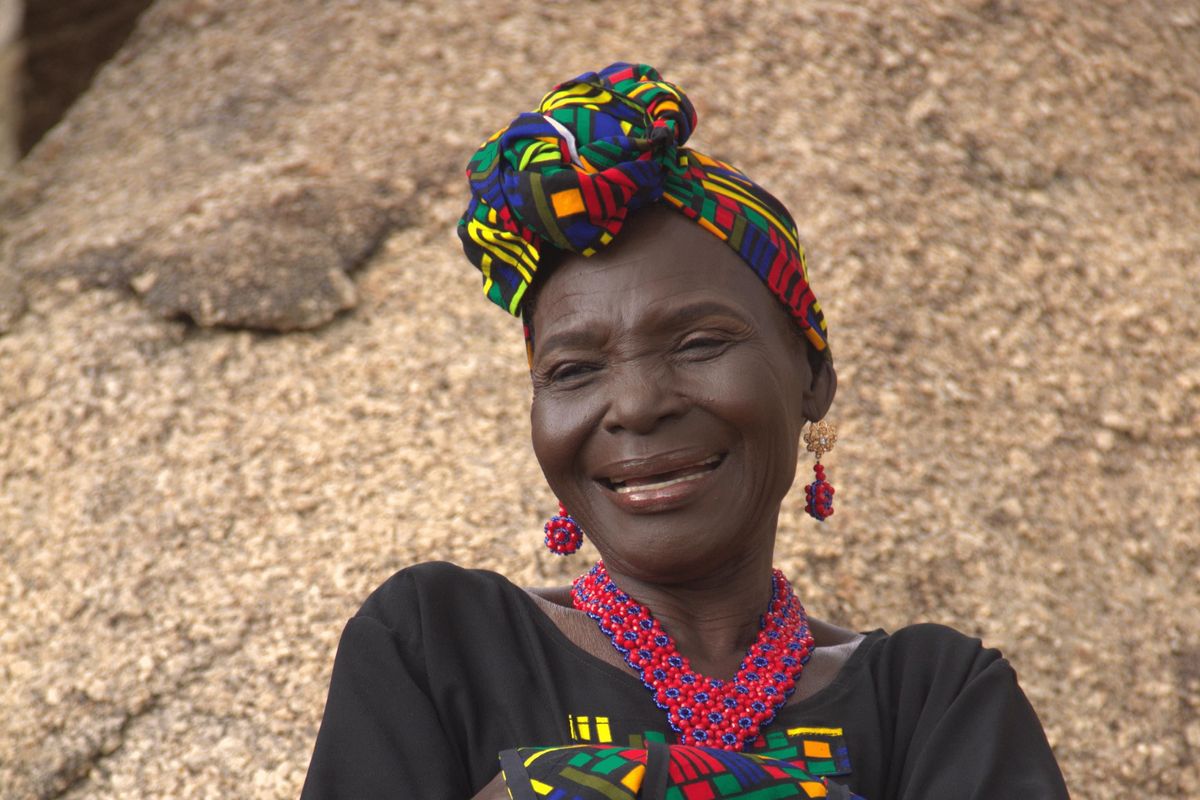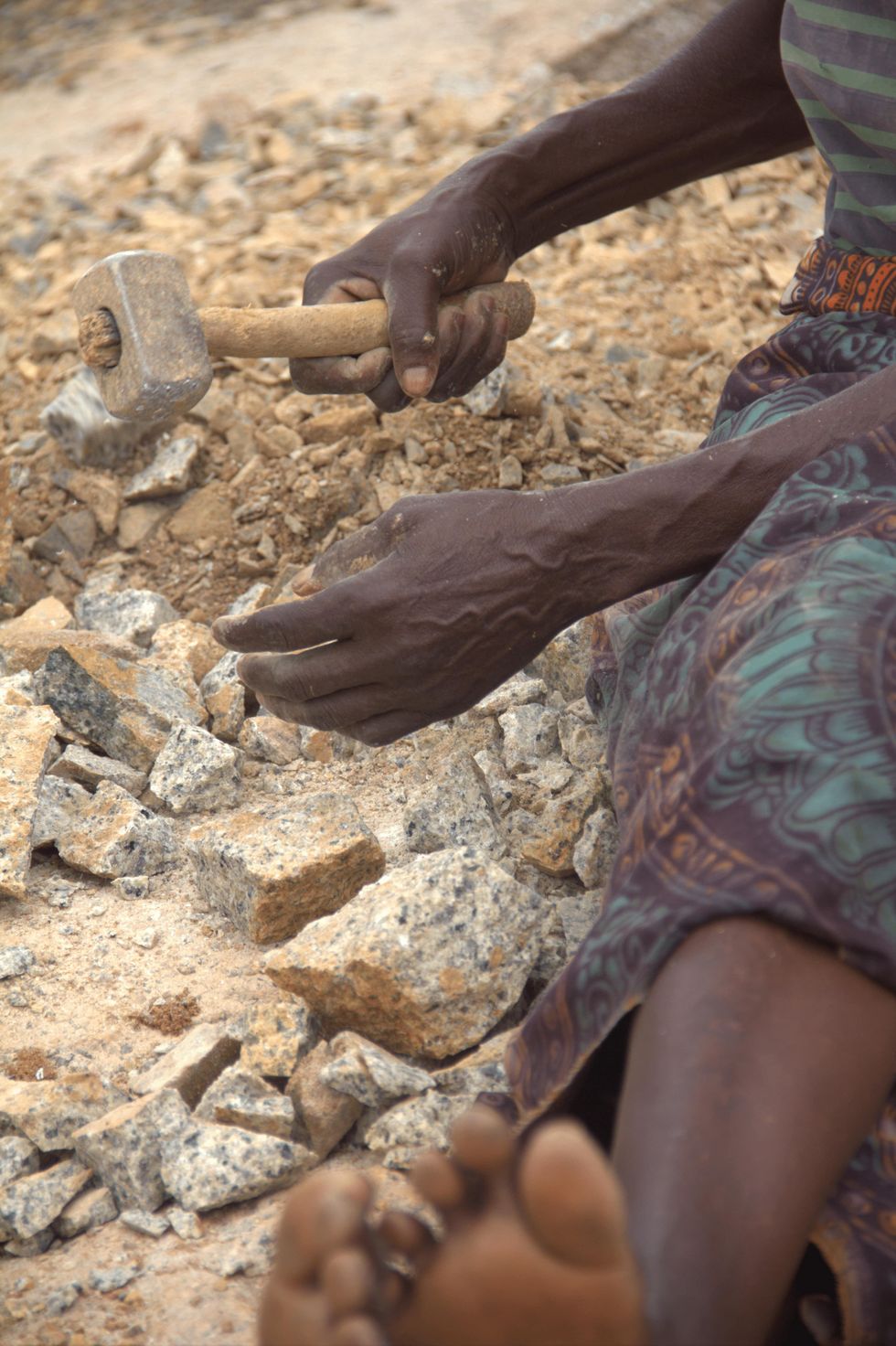Dorcas Sheffy Bello on Finding Stories in Unlikely Places
The Nigerian director is among the filmmakers tapped for the second season of Al Jazeera's acclaimed Africa Direct series.

A still from 'A Stone Crusher’s Song.'
Africa Direct, a series of immersive first-person short documentaries commissioned by Al Jazeera to showcase everyday living on the continent, returns for a second season this month. Like the first season, 14 projects have been selected from filmmakers across the continent. Each one focuses on interesting individual characters within the filmmakers’ respective communities doing something compelling or shaping the world around them.
Filmmaker and journalist Dorcas Sheffy Bello is one of two Nigerians included this season. Other countries represented include Kenya, Mali, Mozambique and South Africa. Bello’s film, A Stone Crusher’s Song profiles a grandmother, Mama Hamsatu Izang, navigating two very different realities -- that of a life-long stone crusher barely getting by, and more recently, as a viral social media star and musician.
Bello spoke with OkayAfrica about finding interesting stories in the unlikeliest of places and making Jos, Plateau state the center of her storytelling mission.
How did you become part of the Africa Direct project?
My friend and I share filmmaking opportunities with each other. He forwarded me the link for the call out. I read it, and I knew immediately that it I was looking at a great opportunity because I like to tell stories that shift the narrative on Africa. Also, as a journalist I had always wanted to work with Al Jazeera, so I gave it a shot.
What about A Stone Crusher’s Song made it the right fit for Africa Direct?
I think of it as an instance where opportunity meets preparedness. I have worked as a freelance journalist for maybe three years now so I have a bank of story ideas I can always pull from. When Africa Direct came around, I asked myself, “What is my strongest story at the moment?” I pitched two stories, but A Stone Crusher’s Song was my best foot forward and I put in a lot of energy and time to get it off the ground. I received call backs for both stories actually, but this particular one was my favorite.
Why do you think it was a favorite?
First, because of its uniqueness. This isn’t a story you see out there all the time. I really do not know any 70-year-old singer who actually became popular that late in life. It was also quite serendipitous how mama was discovered by a high-profile producer, Mr Kleb, who has worked with Burna Boy. It was a story I looked forward to telling.
Did you go to this story, or did it come to you?
I always joke that even though journalists and filmmakers are always on the lookout for good stories I think I attract them to myself. Most of my stories come to me by chance, maybe on social media or after a good conversation with someone. This particular story was a small trend on social media. This guy who happens to be a producer says he was walking and heard mama singing and was so struck, he decided to take her to the studio. I was immediately impressed by the fairytale nature and wondered why more people weren’t covering it. I reached out, and they both agreed. By this time Mama’s song, Takama was already a minor hit. I was in Lagos and when a DJ played the song I remember feeling some ownership of it. All of this reinforced my need to tell this story.
How did you build your relationship with mama?
I started with writing the story as an article but always knew it was a story that needed the visual treatment. I am from Jos but live in Abuja, so I asked my younger sister to go speak with her at first. She established contact with Mr Kleb, who doubles as mama’s manager and producer. When I pitched the story to Africa Direct, I hinted to them, and we all prayed it would be accepted. So, she was always in the loop. When we met, we hugged as if we had known each other for years and our bond was instantaneous. There was this synergy that made every moment fun for the entire crew.
You describe yourself as a journalist, but you have an interesting cinematic eye. What is your journey to film?
Before I became a journalist, I was a self-taught filmmaker. I wanted to be a thespian but fortunately or otherwise in University I ended up in the English department. In my third year I had this course, African oral literature and an assignment was to document five stories in our language using audio recordings. I was fascinated with visuals already at this time so I asked if I could make mine a visual documentary, and my lecturer was excited. I called my cousin who was in the film institute in Jos and he brought on his friends. We envisioned a Tales by Moonlight-inspired narrative. I had the best project that year. After this experience, I knew it was going to be filmmaking for me. So, during the day I was a scholar of English, and at nights I would take filmmaking classes and watch videos on YouTube. Journalism came much later, and by chance.

'A Stone Crusher’s Song' profiles a grandmother, Mama Hamsatu Izang, navigating two very different realities -- that of a life-long stone crusher barely getting by, and more recently, as a viral social media star and musician.
Photo: Dorcas Sheffy Bello
What was your visual approach to mama’s story?
For me the question is, how can I tell the story using strong visual elements? I looked for people who are as crazy as I am to join my crew. I have the tendency to overwork people because I would rather have more footage than less. I would often catch myself wondering if I was overworking mama, but I realized she is just as energetic as I am. We both love to work. In fact, I was asking her to calm down. She was in love with the camera, and it loved her back.
Even though Jos is separate from mainstream Nollywood, it is such an important creative hub…
I work in Abuja, but ninety six percent of my stories come from Jos, maybe because it is my natural habitat. Jos is the creative hub of the country as a lot of artists have ties to the city. The land is so rich with stories I don’t know if you can find anywhere else. A woman who turns her home to a school because of the poor literacy rate among children in her community, people generating power devices from electric waste. These are examples of the kinds of stories I have found. It looks like a small place, but the stories are countless, if you are perceptive. Sadly, Jos supports creativity but not business or development structures, so everyone has to leave eventually to achieve their full potential. It’s a lot of exporting talent going on. But I tell people if you can survive in Jos, you can survive anywhere.
A Stone Crusher’s Song debuts on Al Jazeera on the 27th of December, while Africa Direct runs in blocks, weekly through 10 January 2023.
- A New Film Looks To Tell 'The Unseen' Stories Of Post-Colonial Namibia ›
- You Can Now Watch the Documentary 'Bigger Than Africa' on Netflix ›
- Kofi Ofosu-Yeboah Debuts ‘Public Toilet Africa’ at SXSW ›

